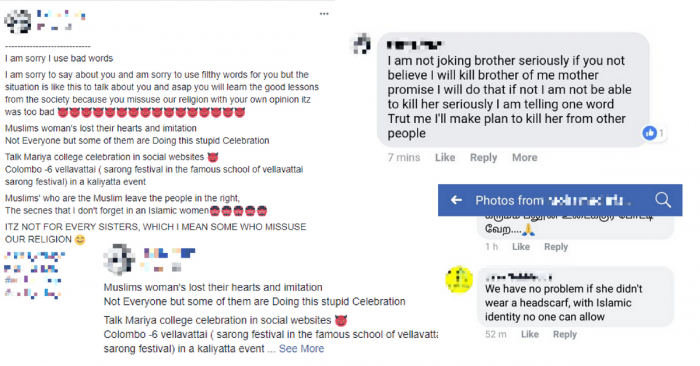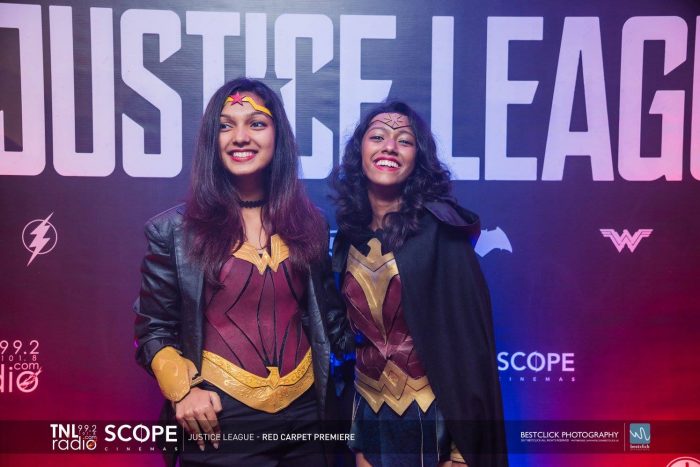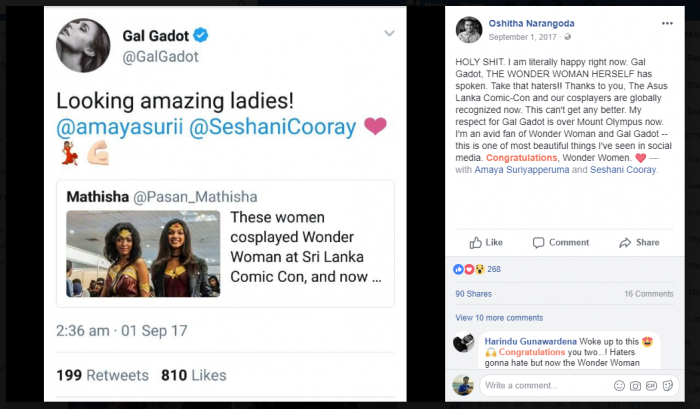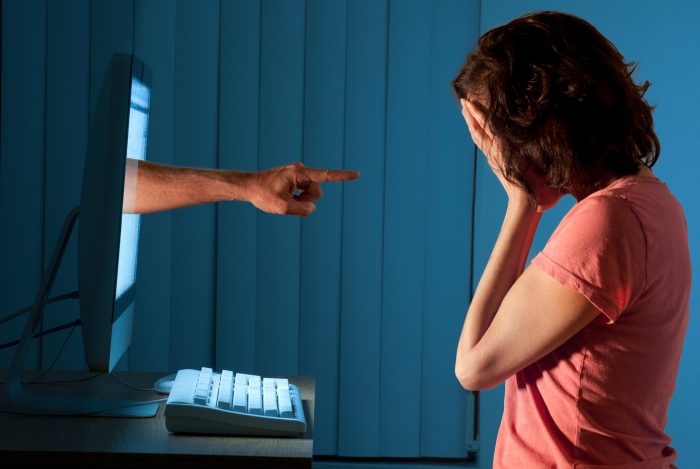The music is deafening and the lights are blinding. It’s chaotic but you’re enjoying it as you dance your worries away. Amidst the chaos, a photographer snaps your picture. He’ll post it on Facebook and promote it everywhere to get as many likes as possible. You’re not too worried, this is normal. But then the next morning, as you wake up, you’re greeted with a stream of notifications. All of them are messages from strangers saying, “You should be ashamed of yourself!” Thus, the ugly cycle of Sri Lankan cyberbullying begins.
You might think this can’t happen to you
Yet, that’s exactly what happened to *Fathima on the 22nd of April 2018. A picture was taken of her alongside one of her male batch mates while playing a game at a party hosted by her university. Once the photographers had shared the pictures online, they were picked up by religious fanatics who proceeded to mock her relentlessly.
Many of these posts shamed her for simply being a Muslim girl pictured with a boy. And these posts went viral on Facebook, WhatsApp, and other social networks. Soon afterward, the abuse escalated with Fathima’s phone number having been leaked. Suddenly, it went from verbal abuse to constant harassment and even death threats.

Horrified at the sheer scale of the cyberbullying, Fathima closed her social media accounts and is now terrified to even step out of the house. As such, it needs to be clearly stated that she did absolutely nothing wrong. Contrary to the questionable beliefs of religious fanatics, a woman has every right to associate with anyone she wishes.
However, this isn’t something that magically appeared overnight. Religious extremism has led to a dangerous social norm of segregation. As a result, women are second-class citizens in the eyes of the fanatics in the local Muslim community. While they are a minority within the community, they are a vocal minority.
However, it’s important to note Sri Lankan cyberbullying isn’t exclusive to religious or ethnic boundaries. It’s an ugly phenomenon that’s been happening for many years. And for proof, one only needs to look back in time to August 2017.
Wonder Woman takes on Sri Lankan cyberbullying
Last year at Lanka Comic-Con, Amaya Suriyapperuma and Seshani Cooray both chose to cosplay as Wonder Woman. On the first day, everyone praised them for their costumes. But once again, after their pictures were published online, they were picked up by Facebook pages that proceeded to publish a barrage of demeaning memes.

Initially, Amaya’s friends tried to hide it from her. But when she found out, she says, “Contrary to what many people thought I wasn’t sad or emotional when I found out about the memes. I was just shocked and I just couldn’t fathom why people who didn’t even know me should worry about how I look or what I do with my life and why they’d spend their time and energy mocking someone that means nothing to them.”
Her fellow cosplayer Seshani too was targeted with the memes. However, they weren’t facing this onslaught of cyberbullying alone. The moment the news broke out, the entire Sri Lankan geek community rallied around the two women. Almost immediately, they got to work reporting the memes to Facebook. Soon after, both Gal Gadot – the actress that played Wonder Woman and Patty Jenkins – the director of the hit movie came out in support of the two women.

The tide had turned and the trolls were defeated. But this wouldn’t have been possible had it not been for the local geek community coming out in numbers and being a vocal majority against hate. Amaya’s and Seshani’s story shows us that Sri Lankan cyberbullying is not a new phenomenon nor one limited to religious grounds. It’s an ugly universal characteristic of the internet.
Additionally, when the cyberbullying first began, Amaya considered reporting the case to SL CERT. However, she quickly dismissed the notion as being pointless. And it’s not hard to see why.
The police turn a blind eye to digital death threats
In June 2016, YAMU.lk published a video about the toilets at the Bandaranaike International Airport. The comedy video featured its then editor Kinita Shenoy discussing an international article voting the BIA as one of the world’s worst airports, and her personal experience with the poor state these toilets were in. Initially, the comments that came said she was overdramatizing the issue.
Kinita wasn’t too concerned as she was used to people telling her she was wrong. But then things escalated and took a darker turn. She started receiving messages from strangers that described seeing her outdoors at places like restaurants with terrifying accuracy and threatened to assault her. Ironically, some of the verbal assaults and insults came from women that described themselves as feminists.
Yet, there was nothing funny about this irony. Speaking to ReadMe, Kinita described it as, “This kind of stuff is scary because Colombo is a small town and these weren’t empty threats.” She shut herself indoors and only went outside with a group of friends. Even then it was only to places where she knew the management.
By now, things had gone too far. So Indi Samarajiva – Founder & CEO of YAMU.lk took printouts of these messages and went to the Bambalapitiya Police Station. But when he arrived, justice was not what he found. The police said a complaint couldn’t be filed because the threats were made online. They could only take a complaint if the threats were made over a phone call or in person.
Afterward, Kinita spoke with SL CERT about the matter as well. However, while they tried to help, social media wasn’t in their jurisdiction. Their power was limited to taking down websites (if they were hosted in Sri Lanka) and dealing with high-level cases such as financial fraud. This was when Kinita was told by the authorities that the law doesn’t cover online harassment. As such, the hands of the authorities were tied.
The poor arguments against cyberbullying
Some might argue that the internet is a harsh place by nature. As such, if you don’t want to get abused then you should be careful what you post. However, as the stories of Fathima, Amaya, and Seshani show us, we have little control over the content that gets published on the internet.
If you go to an event today, a photographer will take your picture and then publish it on Facebook. This is considered to be normal. It’s only after the photos get published that you can ask the photographer to take them down. But once anything is published on the internet, it becomes public and stays there forever.
As such, to tell the victims of cyberbullying to be careful of what gets posted on the internet is not only a poor argument but an insulting one.
It’s no longer cyberbullying; it’s cyber exploitation and violence
Cyberbullying is nothing new in the Sri Lankan digital space. Fathima’s story is the latest one we know of. But these three stories we touched upon are merely the tip of the iceberg of a larger problem. There are many other victims out there. They too could be victims of humiliation, harassment, threats, blackmail, revenge porn, and so many other forms of digital violence.

But what’s terrifying is that today these efforts while carried out by disorganized trolls have specific targets. As such, one can argue that calling it cyberbullying is too simplistic. Rather, a more accurate term would be cyber exploitation and violence – a phrase that better highlights the scale of the harm inflicted on the victims
And there are many such victims, yet they are silent as they feel terrified and helpless. It doesn’t help that as we saw in the case of Kinita, the authorities can’t do anything. Furthermore, even content platforms like Facebook have admitted that they can’t do a proper job moderating content in Sinhala.
What you can do to help these victims
Yet, as we learned from the story of Amaya and Seshani, hate can be silenced and victims can find some hope when the silent majority comes out to support them. And it all starts in the comments section, which Kinita describes saying, “has a sheep mentality.”
When one person starts hurling threats in a Sri Lankan comments section, others follow suit believing they have strength in numbers. This is why the saying, “Don’t feed the trolls,” has become irrelevant. Instead, they’re now empowered by our inaction and are willing to do more harm.
They say don’t feed the trolls but the trolls are the vocal ones. People need to start standing up for what they believe in.
Kinita ShenoyAs such, it’s more important than ever, that when we see instances of cyber harm we make a stand against the trolls. It can be in the comments section facing them head-on. If you feel it’s a waste of energy to face the trolls head-on, then post something on your own personal profile.
At the end of the day, Sri Lankan cyberbullying is an ugly beast. Much needs to be done to kill this beast. But you and I taking a stand against it is a good place to start.
*Names were changed for privacy





GIPHY App Key not set. Please check settings